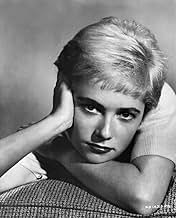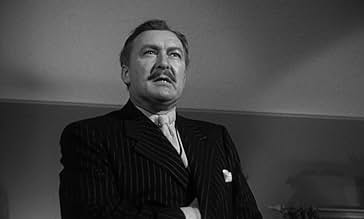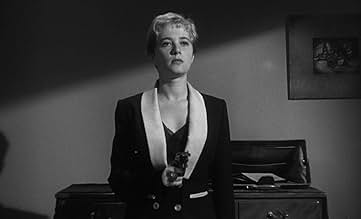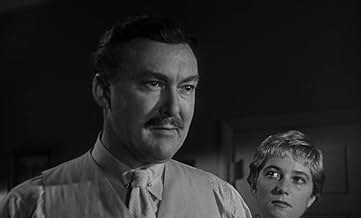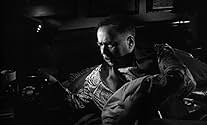CALIFICACIÓN DE IMDb
7.5/10
23 k
TU CALIFICACIÓN
Una autoestopista para a Mike Hammer y lo envuelve en un torbellino de intriga.Una autoestopista para a Mike Hammer y lo envuelve en un torbellino de intriga.Una autoestopista para a Mike Hammer y lo envuelve en un torbellino de intriga.
- Dirección
- Guionistas
- Elenco
- Premios
- 1 premio ganado y 1 nominación en total
Marian Carr
- Friday
- (as Marion Carr)
Mady Comfort
- Nightclub Singer
- (as Madi Comfort)
- Dirección
- Guionistas
- Todo el elenco y el equipo
- Producción, taquilla y más en IMDbPro
Opiniones destacadas
If The Maltese Falcon (1941) was the definitive true detective movie, The Big Sleep (1946) the definitive glamourized detective movie, and Chinatown (1974) the definitive allegorical detective movie, then Kiss Me Deadly is the definitive sleazy detective movie.
Mickey Spillane's sadistic private eye Mike Hammer, turned from successful private eye to sleazy bedroom dick, is the quintessential anti-hero, doing just about anything and everything wrong to get a piece of the pie that the characters call "The Big What's-it."
The movie survives by giving the usual Spillane buckets-of-blood story and its protagonist new dimensions. Right from the electric opening scene and the audacious opening credit sequence, the audience is drawn into Hammer's seedy world, where morality is suspended, and the credo of the end justifying the means dominates Hammer's actions. His reckless abandonment is almost never questionned and the film seems to understand his brutality as what he must do to get the job done in an equally brutal world.
Director Robert Aldrich observes all of it with an objective eye that neither glorifies nor condemns the action on-screen, letting the audience draw its own conclusions--even where the plot is concerned. The pace is unrelentless and the plot turns are never fully explained, forcing the audience to participate willingly in all that Hammer does to, hopefully, see the story through to its ending.
And what an ending! I'd de damned to a special place in Hell if I elaborated, so I'll just say that it's one of the greatest I've ever seen. That goes same for the movie itself, which is one of the most stylish, jarring and truly entertaining movies of its genre.
Mickey Spillane's sadistic private eye Mike Hammer, turned from successful private eye to sleazy bedroom dick, is the quintessential anti-hero, doing just about anything and everything wrong to get a piece of the pie that the characters call "The Big What's-it."
The movie survives by giving the usual Spillane buckets-of-blood story and its protagonist new dimensions. Right from the electric opening scene and the audacious opening credit sequence, the audience is drawn into Hammer's seedy world, where morality is suspended, and the credo of the end justifying the means dominates Hammer's actions. His reckless abandonment is almost never questionned and the film seems to understand his brutality as what he must do to get the job done in an equally brutal world.
Director Robert Aldrich observes all of it with an objective eye that neither glorifies nor condemns the action on-screen, letting the audience draw its own conclusions--even where the plot is concerned. The pace is unrelentless and the plot turns are never fully explained, forcing the audience to participate willingly in all that Hammer does to, hopefully, see the story through to its ending.
And what an ending! I'd de damned to a special place in Hell if I elaborated, so I'll just say that it's one of the greatest I've ever seen. That goes same for the movie itself, which is one of the most stylish, jarring and truly entertaining movies of its genre.
So the big what'sit is what it's all about and this big what'sit is without a doubt, flat out phenomenal. Ralph Meeker snarls and sneers his way thru a bevy of sadism and selfishness in this superb, unflinching look at amorality beneath happy go lucky 50's sensibilities. Biting and wicked and never dull, and filled with more amazing characters than one movie deserves, this is a knock out classic that you will enjoy wallowing in repeatedly.
"Kiss Me Deadly" had few similarities with Spillane's story about a gang of dope traffickers
Instead Aldrich reworks the plot so that the criminals are mixed up in the theft of priceless and high1y dangerous radioactive material which they are planning to smuggle to an unnamed power
The complicated story begins with Hammer picking up a scared girl on a lonely road at night and continues through the girl's subsequent death, a kidnapping and a series of very brutal killings
Spillane's Mike Hammer remains the ultimate in violent private eyes The killings seem to matter less than the sadism One scene in which Hammer deliberately breaks the irreplaceable records of an Italian opera lover in order to get the information he wants is more repellent than any of the murders in the film
Furious but stylish, "Kiss Me Deadly" is a film of great power and stays unique for its mixing of art and pulp fiction
Spillane's Mike Hammer remains the ultimate in violent private eyes The killings seem to matter less than the sadism One scene in which Hammer deliberately breaks the irreplaceable records of an Italian opera lover in order to get the information he wants is more repellent than any of the murders in the film
Furious but stylish, "Kiss Me Deadly" is a film of great power and stays unique for its mixing of art and pulp fiction
Robert Aldrich was a no-nonsense film director. When he undertook the direction of this film, little did he know it was going to become the extraordinary movie it turned out to be. The fame seems to have come by its discovery in France, as it usually is the case. Based on Mickey Spillane's novel and adapted by Al Bezzerides, the movie has an unique style and it's recommended viewing for fans of the film noir genre.
Right from the start, the film gets our imagination as we watch a young woman running along a California highway. That sequence proved Mr. Aldrich's ability to convey the idea of a disturbed young woman that seems to have escaped from a mental institution. The plot complicates itself as Hammer learns that Christine, the young woman, has died. He decides to investigate, which is what he does best.
Some excellent comments have been submitted to this forum, so we will not even try to expand in the action but will only emphasize in the tremendous visual style Mr. Aldrich added to the film, which seems to be its main attraction. For a fifty year old film, it still has a crisp look to it thanks to the impressive black and white cinematography of Ernest Lazlo, who had a keen eye to show us Hammer's world as he makes it come alive. The great musical score by Frank DeVol fits perfectly with the atmosphere of the L.A. of the fifties.
Ralph Meeker made an excellent contribution as Mike Hammer. He dominates the film with his presence. Albert Decker, Paul Stewart, Miriam Carr, Maxine Cooper, Fortuno Bonanova, and especially Cloris Leachman, in her screen debut, make this film the favorite it has become.
Fans of the genre can thank Mr. Aldrich for making a film that didn't pretend to be anything, yet has stayed as a favorite all these years.
Right from the start, the film gets our imagination as we watch a young woman running along a California highway. That sequence proved Mr. Aldrich's ability to convey the idea of a disturbed young woman that seems to have escaped from a mental institution. The plot complicates itself as Hammer learns that Christine, the young woman, has died. He decides to investigate, which is what he does best.
Some excellent comments have been submitted to this forum, so we will not even try to expand in the action but will only emphasize in the tremendous visual style Mr. Aldrich added to the film, which seems to be its main attraction. For a fifty year old film, it still has a crisp look to it thanks to the impressive black and white cinematography of Ernest Lazlo, who had a keen eye to show us Hammer's world as he makes it come alive. The great musical score by Frank DeVol fits perfectly with the atmosphere of the L.A. of the fifties.
Ralph Meeker made an excellent contribution as Mike Hammer. He dominates the film with his presence. Albert Decker, Paul Stewart, Miriam Carr, Maxine Cooper, Fortuno Bonanova, and especially Cloris Leachman, in her screen debut, make this film the favorite it has become.
Fans of the genre can thank Mr. Aldrich for making a film that didn't pretend to be anything, yet has stayed as a favorite all these years.
First-rate Mickey Spillane adaptation, easily the best film version of any of his novels that I've seen. Private eye Mike Hammer (Ralph Meeker) investigates the reasons behind the death of a hitchhiker (Cloris Leachman in her film debut). It's a gritty, tough, violent noir with some good dialogue and morally grey (at best) characters. Meeker's the perfect Hammer. Albert Dekker has a small but important part. The rest of the cast is good except for Nick Dennis, who goes full Eli Wallach in his role as Hammer's mechanic friend. Robert Aldrich directs with style. The ending is pretty cool, but it's definitely one of those "love it or hate it" things. It's certainly memorable, which I think most of us can agree is part of what makes any film great.
¿Sabías que…?
- TriviaThe Kefauver Commission, a federal unit dedicated to investigating corrupting influences in the 1950s, singled this out as 1955's number one menace to American youth. Because of this, Robert Aldrich felt compelled to conduct a writing campaign for the free speech rights of independent filmmakers.
- ErroresAt the beginning, Christina (Cloris Leachman) is shown running at the side of the highway, but the shots of only her feet show her running along the painted center line of the highway.
- Citas
Mike Hammer: You're never around when I need you.
Velda: You never need me when I'm around.
- Créditos curiososThe opening credits scroll down instead of the usual up, resulting in needing to read them bottom to top.
- Versiones alternativasUntil 1997, all known copies in circulation of "Kiss Me Deadly" ended rather abruptly: the wounded Mike Hammer stumbling through the beach house looking for his partner Velda, and then there's a couple of brief shots of the house exploding and burning, with "The End" superimposed on the final shot. The music is cut off instead of fading out, and the screen turns black; it looks like Mike and Velda died in the blaze.
- ConexionesEdited into American Cinema: Film Noir (1995)
- Bandas sonorasRather Have the Blues
Sung by Nat 'King' Cole
Written by Frank De Vol (uncredited)
[Played on the car radio during the opening title card and credits]
Selecciones populares
Inicia sesión para calificar y agrega a la lista de videos para obtener recomendaciones personalizadas
Detalles
- Fecha de lanzamiento
- País de origen
- Idiomas
- También se conoce como
- Kiss Me Deadly
- Locaciones de filmación
- Clay Street, Bunker Hill, Downtown, Los Ángeles, California, Estados Unidos(Mike parks his Corvette and takes the back steps up to the Hillcrest Hotel)
- Productora
- Ver más créditos de la compañía en IMDbPro
Taquilla
- Presupuesto
- USD 410,000 (estimado)
- Total en EE. UU. y Canadá
- USD 726,000
- Total a nivel mundial
- USD 952,000
- Tiempo de ejecución
- 1h 46min(106 min)
- Color
- Relación de aspecto
- 1.85 : 1
Contribuir a esta página
Sugiere una edición o agrega el contenido que falta



